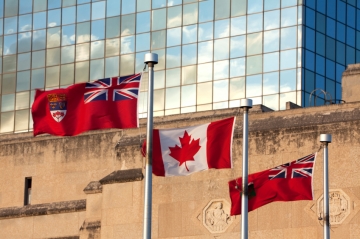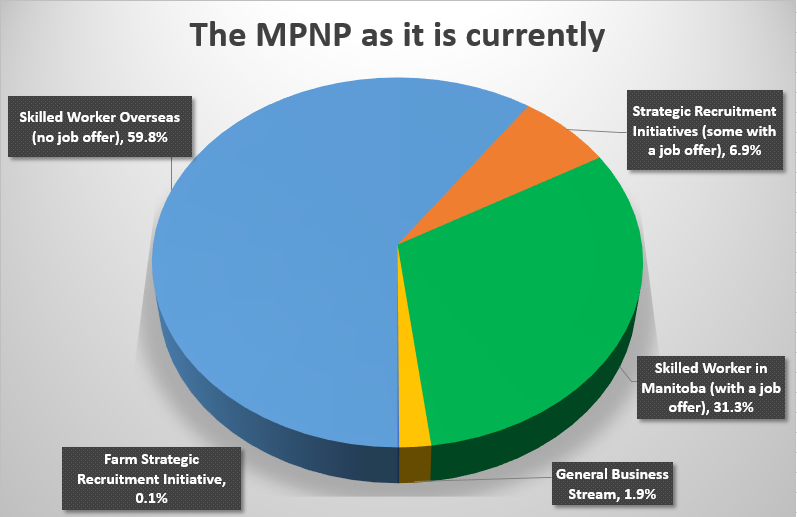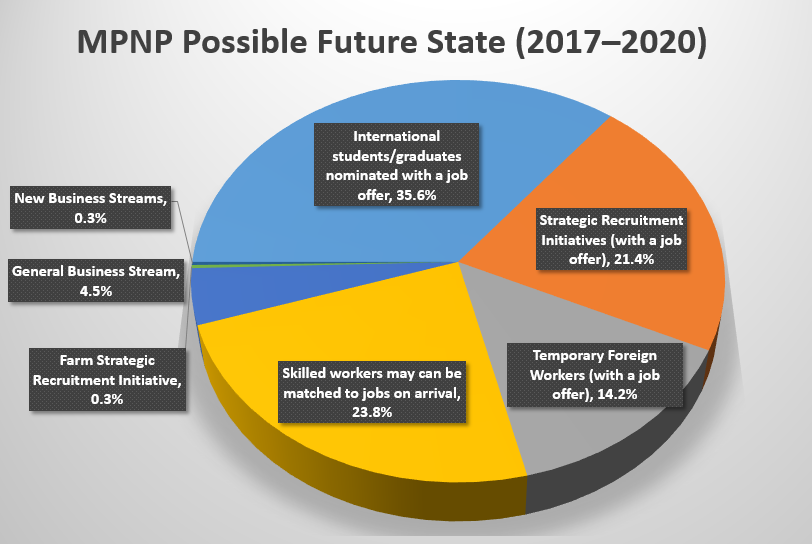Manitoba Outlines Immigration Strategy for 2017 and Beyond
 The government of Manitoba has released a new Labour Market Strategy for immigration through the Manitoba Provincial Nominee Program (MPNP). This province, located in central Canada, has been an increasingly popular destination for newcomers to Canada over recent years, principally due to plentiful job opportunities and a high standard of living.
The government of Manitoba has released a new Labour Market Strategy for immigration through the Manitoba Provincial Nominee Program (MPNP). This province, located in central Canada, has been an increasingly popular destination for newcomers to Canada over recent years, principally due to plentiful job opportunities and a high standard of living.
The new immigration strategy will aim to match nominees to priority labour market demands. Although it is expected that most nominees under the skilled worker categories will be nominated with a job offer, a portion will be nominated without a job offer; this latter group may then be matched to jobs upon arrival in the province.
Why a new strategy?
The new strategy comes only a few months after a change of government in Manitoba, with the Progressive Conservatives having taken office from the outgoing Manitoba New Democratic Party (NDP) government in April.
Manitoba's Labour Market Projections for 2016–2022 indicate an ongoing need for immigrant skilled workers who have sector- and occupation-specific skills, as well as for entrepreneurs who can start businesses that will create local jobs. It is projected that over the coming years there will be 167,700 job openings from both expansion and replacement of existing labour, and about 25 percent of this demand will need to be filled by new immigrants. The sectors with the highest demand include sales and service, business and finance, trades and transportation, and health, and most job openings will require workers with the right training and skill sets.
In its 2017 Immigration Levels Plan, the federal government provided increased immigration targets through the economic categories, and stated its aim to increase immigration levels even further over time. As a result, the government of Manitoba is confident that it can increase its share of nominations over the coming years. The province aims to improve the existing MPNP Expression of Interest system for skilled workers by connecting more with employers and providing a clearer pathway to permanent residence to international students, as well as foreign workers in Manitoba and overseas.
The province aims to move the MPNP more towards a demand-driven model based on better labour market information and performance measurement.
The MPNP in its current state
The vast majority (98 percent) of all MPNP nominations issued last year were in the Skilled Worker categories. Of this 98 percent, 58 percent of those nominations were issued to foreign workers and 42 percent to international students who had graduated from a Designated Learning Institution in Manitoba. The remaining nominations were issued through the business categories.

Over recent months, MPNP draws under the Skilled Workers Overseas sub-category have focused on candidates who were directly invited by the MPNP under a Strategic Recruitment Initiative.
These initiatives include:
- Recruitment missions. These overseas employment/immigration fairs involve MPNP representatives interviewing foreign skilled workers and subsequently inviting them to apply after they have made a formal Expression of Interest (EOI) to the MPNP.
- Exploratory visits. The MPNP may invite people who have undertaken a pre-approved Exploratory Visit and passed an interview with a program official.
Toward a future MPNP
In its draft plan, the government of Manitoba has pinpointed a number of ways in which the MPNP may become more dynamic through a number of industry and education partnerships, as well as further segmentation of the province’s immigration allocation to allow for more targeted recruitment of newcomers.
The province has provided the following blueprint for a future MPNP, beginning in 2017. The province notes that these figures are in the planning stage only, and the ultimate make-up of the program may become slightly different.

Other changes to come in 2017
Currently, there is no government application processing fee for applicants who are invited to apply to the MPNP as a skilled worker. However, as of April, 2017 a non-refundable fee of $500 will be introduced, the proceeds of which the provincial government says will be used to help eliminate the existing backlog in applications. This fee will only be charged to candidates drawn from the Expression of Interest pool and invited to submit a complete application to the MPNP.
The government states that it will then launch new nomination pathways and program improvements, outlined above, after April, 2017.
Manitoba quick facts
Provincial capital and largest city: Winnipeg
Other cities: Brandon, Steinbach, Portage La Prairie, Thompson, Winkler, Selkirk, Dauphin, Morden (which has its own immigration initiative).
Population: 1.3 million
Languages: Province-wide, English is the main language used in all walks of everyday life, including in the home and commercially. There are some French-speaking communities, as well as Tagalog, German, Ukrainian, Chinese languages, and Algonquian languages spoken.
Climate: There is a wide variation in seasonal temperatures across Manitoba, with warm to hot summers and cold, snowy winters. Temperatures and precipitation generally decrease from south to north and increase from east to west. According to Environment Canada, Manitoba ranked first for clearest skies year-round, and ranked second for clearest skies in the summer and for the sunniest province in the winter and spring.
Major industries: The economy of Manitoba is a market economy based largely on natural resources. Agriculture, mostly concentrated in the fertile southern and western parts of the province, is vital to the province's economy. Other major industries include transportation, manufacturing, mining, forestry, energy, and tourism, and the provincial government has projected that employment in sales and service, business and finance, trades and transportation, and health is set to increase over the coming years.
Employment rate: 94%
Major attractions: There is plenty to do in Manitoba throughout the year. Trusted travel site Trip Advisor identified these as the top 10 attractions in Manitoba in 2016.
Learn more about Manitoba.
To find out if you are eligible for the Manitoba Provincial Nominee Program, or any of the available Canadian immigration programs, please fill out a free online assessment today.
© 2016 CICNews All Rights Reserved
- Do you need Canadian immigration assistance? Contact the Contact Cohen Immigration Law firm by completing our form
- Send us your feedback or your non-legal assistance questions by emailing us at media@canadavisa.com







